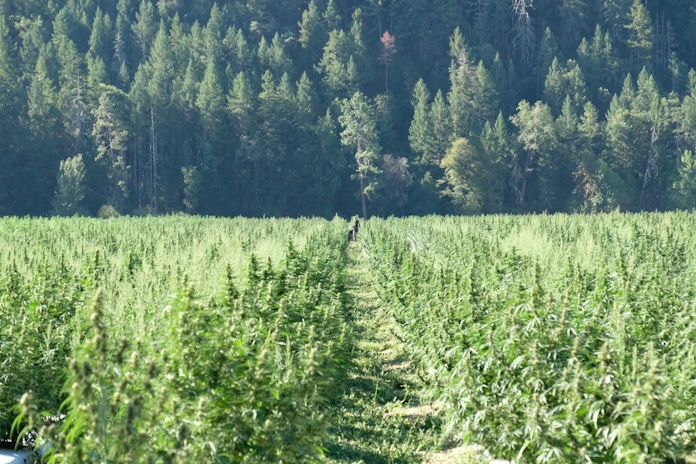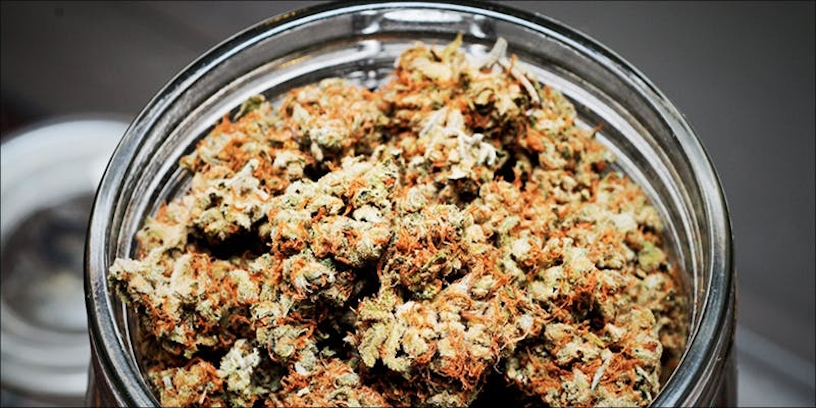
Bigger Yields With HPS Vs. LED Grow Lights
Is LED better than HPS for growing weed? A full LED vs HPS yield comparison, and more.
On a quest to discover the finest lights for growing cannabis? Between fluorescent, LEDs, and high-pressure sodium (HPS) can often leave you perplexed. Is it possible to boost yields and cultivate high-quality cannabis with energy-efficient lights? Kind LED confidently asserts that it is.
Let’s uncover the five intriguing truths about escalating yields with LED vs HPS grow lights.
HPS Vs LED Yield

For years, HPS lights have been the high-yield champion. Nevertheless, there’s a new kid on the block who isn’t just putting up a fight – they’re often landing the knockout punch. Enter LED, the cannabis yield hero we all deserve to know about.
In one corner, we have a tried and tested workhorse, the 600w HPS light, capable of pumping out a respectable 150 to 300 grams in prime conditions. That’s about 0.5 grams of cannabis per watt, a performance that has been the go-to choice for many growers.
In the more formidable corner, we have the LED light, a flexible system often generating impressive yields as high as 1 to 1.5 gram per watt LED. The more impressive element? LED lights do this while sipping on energy, compared to the rival HPS that chugs it.
So, when it comes to what yields more, HPS or LED, it seems that LED takes the lead.
Companies like Kind have been at the forefront of this green revolution. Their products aren’t just lighting fixtures – they’re precision tools that use high-quality lenses to focus lights from all spectrums onto your cannabis canopy. This means that tiny light particles, called photons, are directed exactly where they need to be most, rather than conventional methods that randomly disperse photons and often fizzle out when needed most.
When you choose a product like Kind’s, you’re not just buying a light; you’re investing in focus,d plant-loving photon power that gives your crops the best chance to maximize yield potential.
LED Vs HPS Bud Quality
Have you heard whispers that say LED lights can produce fluffy buds? Well, ignore them, because LED lights are not your source of fame when it comes to bud structure.
At the end of the day, good light can’t change a plant’s DNA, but it sure can help it reach its full potential. When combined with optimal soil or hydroponic mediums, Kind’s LED systems have a reputation for coaxing out heavenly terpenes and producing impressive flowers.
Let’s dive into some quick numbers – typical cannabis flowers strut around with a terpene level of about 2%. With Kind, they’ve cranked that terp dial up to an eye-watering 3.78 using the X series – almost double the norm.
Let’s remember, terpenes aren’t just about flavor. These little beauties have a fantastic relationship with cannabinoids like THC and CBD. Paired together, an enhanced spectrum of synergistic benefits is undoubtedly experienced.
In the cannabis garden, Kind’s LED lights are possibly your golden ticket to incredible buds. Forget fluffy – with LEDs, we’re talking plush, flavorful, aromatic buds that will have your senses tingling.
Designed With The Right Spectrum
Wattage can serve as the ultimate distraction in a grower’s search for the best-growing light.
When out shopping for grow lights, savvy growers know to peek behind the wattage curtain and check out the photosynthetically active radiation (PAR) value, which essentially means available light for the plant to use.
HPS lights consistently have lower PAR values than LED lights. Enters Kind LED grow lights, yet again, with their carefully designed lighting system to produce a nuanced kind of spectrum for your plants. With extremely high PAR readings, these LED lights can distribute a diverse range of light wavelengths, available for plants to use.
Kind LED grow lights are designed to produce the perfect spectrum for your plants. They also have extremely high PAR readings. This means that the plant is able to access a wide diversity of light wavelengths and is able to put the light to use.
Inevitably, higher yields result in the plant’s potent energy source.
Useable CO2
Ever wondered how to supercharge your CO2 to get the most bang for your buck? Let’s talk science.
Plants need CO2 to transform light into energy (it’s like a photosynthesis version of a protein shake). But, here comes a twist: the effectiveness of CO2 is directly linked to temperature.
When using high-intensity discharge lights (HIDs), your grow room temperature should ideally sit at about 72-78 degrees Fahrenheit. However, CO2 ideally performs best at 82-86 degrees, making you feel like you’re balancing a challenging seesaw.
Don’t despair – Kind’s LED Bar Lights rise to the rescue, ready to conquer this temperature battle. These lights can weather most conditions without breaking a sweat – whether they’re cozying up in a small-scale operation or a grow room that’s akin to a jungle, these lights can help you squeeze every last bit of goodness from your CO2.
Why does any of this matter? Well, when you optimize CO2, plants can maximize energy use, leading to larger yields and healthier crops. It’s like giving your plants their very own personal trainer.
For more insider tips on how to create the grow room of your dreams, check out Kind’s article.
What Type Of Light Is Best For Growing Cannabis
Letting the LED out of the bag here: not all LED lights are created equal. There’s a galaxy of differences between high-quality, and, let’s say, less-than-stellar LED lights.
Take a look at Kind’s K3 XL600 series – it’s like the James Bond of LED lights, blending cutting-edge technology with agricultural savviness. Good design isn’t just a bonus, it’s the secret ingredient.
When hunting for the perfect LEDs for growing, remember the Holy Trinity: PAR values, light spectrum, and build quality.
Ready to join the LED revolution? Find your nearest Kind reseller with their handy store locator. For more insider info on HPS and LED lights, check out these illuminating guides: Best HID Grow Lights and How to Grow Better Cannabis with LED Lights.
Are Cheap LED Grow Lights Worth It?
Cheap LED grow lights can be tempting for budget-conscious growers, but their effectiveness often falls short compared to higher-priced options.
While they consume less energy and produce less heat, low-cost LEDs may not provide the full spectrum of light needed for optimal plant growth, potentially leading to lower yields and poor plant health.
Can You Grow With LED And HPS Together?
Yes, you can grow cannabis using both LED and HPS lights combined.
This combination harnesses the strengths of both lighting types: LEDs provide a broad spectrum of light, promoting healthy plant development and energy efficiency, while HPS lights are great for their intense light output, boosting flowering and fruiting. Using both can optimize your grow space for fuller growth, potentially leading to higher yields.
Make sure that you have proper spacing and balance between the two light types to avoid burning the plants during development.
Herb Recommended Products:










